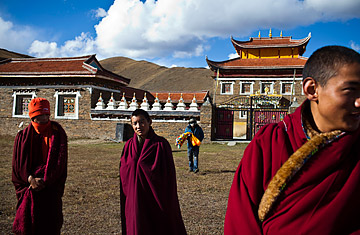
Young Tibetan Monks in Kardze. Throughout greater Tibet, objection to Chinese rule have become increasingly nihilistic.
(5 of 5)
Even now, the Tibetan monks' refusal to disavow their exiled leader has played a role in sparking this wave of conflict. Tsewang Norbu, the monk who set himself on fire in Tawu, lived in the Nyitso monastery, which was prevented from celebrating the Dalai Lama's birthday in July. In previous years, locals say, monks could quietly mark the moment without official intervention. But this year was different. For the monks' disobedience, government officials cut Nyitso's water and electricity. The siege went on for weeks before Norbu emerged from the monastery and walked down the hill to the center of town. For a few minutes, he passed out pamphlets advocating Tibetan independence and celebrating the Dalai Lama. Then out came the kerosene.
It is dark when I drive by the Nyitso monastery. Security cameras are everywhere, as are police vehicles and plainclothes agents. The bulk of the monastery looms behind a wall, and I cannot see anything of interest, certainly not any monks. Many have been removed and sent to re-education camps, according to locals and exile groups, just as in the Kirti monastery in Ngaba, which has produced seven monks or former clerics who have self-immolated. The Tawu government worker says some of the remaining monks in Nyitso are spies who have been deployed to monitor the others. All is gray and shadowy. But I finally see something bright against a wall just inside the monastery. It is not, as I had hoped, a monk in maroon robes. Instead, it is a fire extinguisher, shiny and red and new.
